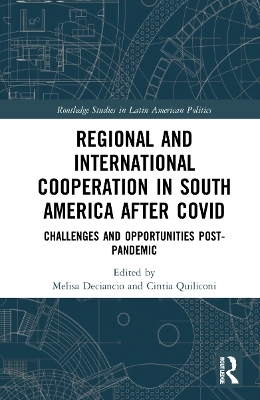
Regional and International Cooperation in South America After COVID
Routledge (Verlag)
978-1-032-13682-0 (ISBN)
This volume analyses South American regional and international cooperation during the COVID19 crisis started in 2020.
Across thirteen chapters a collection of leading experts address how regional collaboration has developed, evolved, and recoiled. The chapters explore the state of regionalism at the pandemic surge and the challenges and opportunities this situation has opened for regional and international cooperation. Authors analyze the role of extra-regional powers and traditional regional leaders during the pandemic, identifying the extent to which regional cooperation has been possible across several policy agendas. They argue that fragmented visions of regionalism, ideological polarization, and weak leadership, has prevailed from before the pandemic which, accompanied by adverse interactions among major powers, has ensured that cooperation has remained bilateral rather than regional. Ultimately all these factors have created a complex scenario in which disintegration dynamics have emerged, darkening, even more, the South American regional panorama.
Regional and International Cooperation in South America After COVID will be an invaluable resource for students, scholars and policy specialists of regionalism and regional integration, Latin American studies, international relations and international political economy.
Melisa Deciancio is Senior Fellow Researcher at the University of Münster and Research Fellow at the National Scientific and Research Council of Argentina, based in the Department of International Relations at FLACSO Argentina. Cintia Quiliconi is Associate Professor at the International Studies and Communication Department of the Latin American School of Social Sciences FLACSO-Ecuador and senior editor of the Oxford Research Encyclopedia of International Studies.
1. Introduction: South American Cooperation: Regional and International Challenges in the Post-Pandemic, 2. Your Regionalism and Mine: The United States and South American Cooperation in the Global Pandemic, 3. China’s BRI extension to South America: Challenges and Opportunities for the Regional Order in the Post-pandemic, 4. Regional and interregional relations between EU and South America: Weathering the COVID-19 storm?, 5. From Regional Leader to Regional Antagonist: Bolsonaro’s anti-South American stance during COVID-19 pandemic, 6. The Venezuelan Connection: The Crisis of South American Regionalism and Western Hemispheric Order Upheaval, 7. From UNASUR to PROSUR: Institutional Challenges to Consolidate Regional Cooperation, 8. Regional Cooperation in health: Challenges and Setbacks in the Pandemic, 9. South America under the pendulum: bilateralism, intermestic security and the return of old practices, 10. The rise and fall of IIRSA and the prospects for regional infrastructure integration in the post-pandemic, 11. Social Movements, care crisis and new opportunities for regional cooperation: the regional integration of female domestic paid workers in Latin America, 12. Social Protests in the Andean Region: Towards New State Forms, 13. Every Man for Himself! The Regional Responses to the Venezuelan Exodus During the COVID-19 Pandemic, 14. Conclusions: Re-thinking regional cooperation for the Post-Pandemic
| Erscheinungsdatum | 05.07.2022 |
|---|---|
| Reihe/Serie | Routledge Studies in Latin American Politics |
| Zusatzinfo | 7 Tables, black and white; 7 Line drawings, black and white; 7 Illustrations, black and white |
| Verlagsort | London |
| Sprache | englisch |
| Maße | 152 x 229 mm |
| Gewicht | 453 g |
| Themenwelt | Sozialwissenschaften ► Politik / Verwaltung ► Europäische / Internationale Politik |
| Sozialwissenschaften ► Soziologie ► Spezielle Soziologien | |
| Wirtschaft ► Volkswirtschaftslehre ► Wirtschaftspolitik | |
| ISBN-10 | 1-032-13682-0 / 1032136820 |
| ISBN-13 | 978-1-032-13682-0 / 9781032136820 |
| Zustand | Neuware |
| Informationen gemäß Produktsicherheitsverordnung (GPSR) | |
| Haben Sie eine Frage zum Produkt? |
aus dem Bereich


